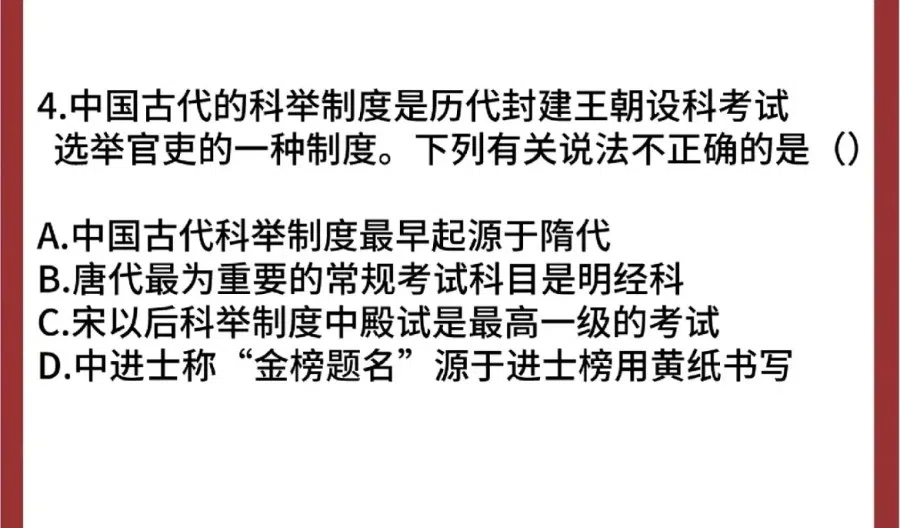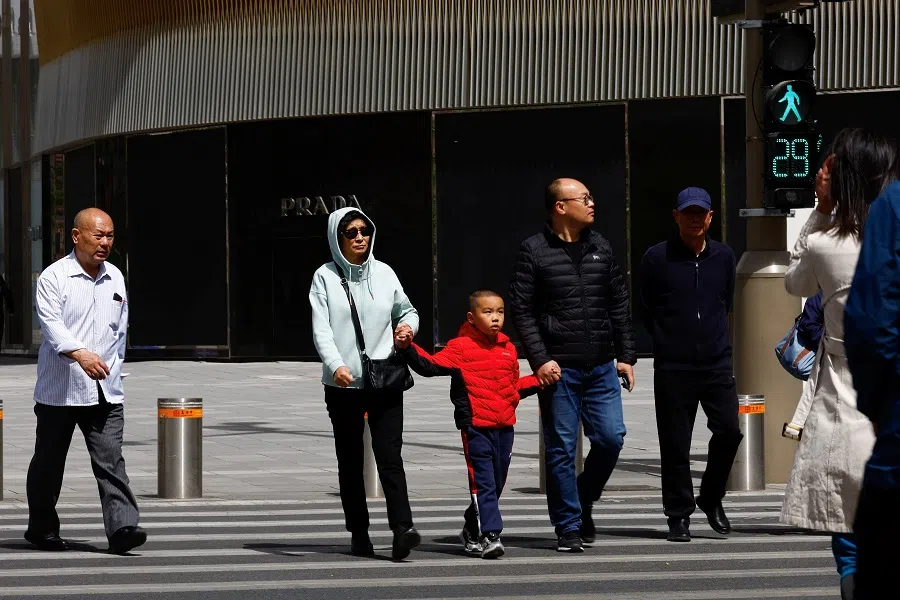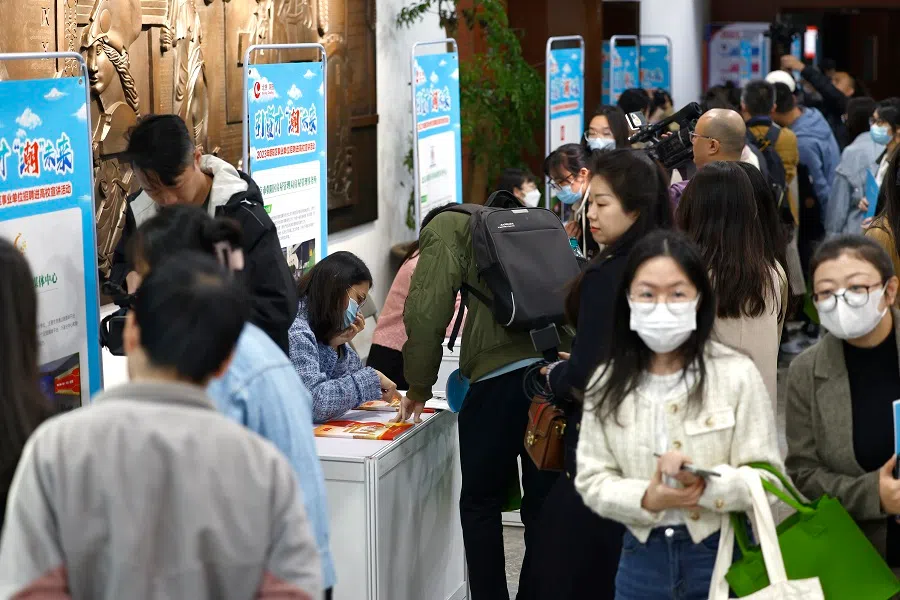Chinese society's obsession with becoming a civil servant
How far would one go to get a job in the civil service? In China, young people are under enormous pressure if they choose to take the civil service exam, pouring everything into it - some tragic cases have ensued. Zaobao's China Desk explores the obsession with getting into the civil service.

Over the past two years, the Chinese civil service examination has attracted increasing attention. With many young people eager to take the exam, the topic has become one of the top online searches in China. In a recently much-discussed episode, a Sichuan woman was diagnosed with schizophrenia after failing the civil service examination for five consecutive years.
On 7 April, China Newsweek reported that the woman could not find a job after graduating from university and was forced by her parents to take the civil service examination for five years. She still did not manage to get a job and started behaving strangely last year, becoming muddled in speech and boasting of being a bureau chief. The woman was subsequently diagnosed with schizophrenia.
Chinese netizens lamented how a young person who could have had a bright future, had instead cracked under pressure and developed mental problems. They also questioned the high standard of the civil service examination and a civil servant's cushy job - why else would parents force their daughter to take the exam for five consecutive years?
The new 'Imperial Exam'
Netizens' comments clearly show that while they are disturbed by how things turned out, they are not surprised. They generally believe that the girl's parents have a crazy obsession with becoming a civil servant and could be more mentally unstable than their daughter.

Weibo user White Coat Lynx (白衣山猫), a surgeon with over four million Weibo followers, noted that while the pressure of preparing for the civil service examination over five years could potentially be one of the external factors triggering schizophrenia, drawing a link between the two is unscientific. However, this argument did not attract much attention.
Many netizens went on to share their own experiences or others' stories, criticising Chinese parents' excessive control over their children, dictating children's lives in the name of "their well-being", thereby triggering many family tragedies.
The Chinese National Civil Service Examination originated from the ancient imperial examination system.
Some netizens also drew comparisons between the incident and the satirical story "Fan Jin Passes the Imperial Exam" from the Qing Dynasty classic The Scholars.
In the story, Fan Jin comes from a poor background but is obsessed with taking the imperial examinations to become an official. He finally passes the exam in his fifties after more than 20 attempts. But amid official congratulations and flatteries from the neighbours and relatives, Fan Jin goes mad from happiness. After being slapped in the face and snapping out of it, he then puts on the airs of an official.
"Fan Jin Passes the Imperial Exam" was included in the junior high school language textbook by the People's Education Press. The story aims to expose the toxic and twisted nature of the feudal imperial examination system, and satires the trend of conformism. It is not surprising that netizens drew comparisons between the incident and the story.

However, most netizens point out that Fan Jin went mad only after passing the exam, and eventually had a successful career. In contrast, the girl who failed the civil service examination will most likely have difficulty becoming a public servant or finding a good job due to her history of mental illness - there is no comparison. They lament that life is more ironic than fiction.
What does the civil service exam test for?
The Chinese National Civil Service Examination originated from the ancient imperial examination system. The current testing method was formalised in 1994 and is the only way for most people to obtain permanent employment as public servants.
... the pass rate is extremely low due to its unique format and the large number of test takers coupled with limited acceptance quota, thus making it one of the most competitive exams in China.
Unlike academic exams such as the gaokao or postgraduate entrance exams, the civil service examination is a job recruitment exam for possible employment. It consists of a written test, interview and assessment. However, instead of assessing a candidate's professional abilities, the written test primarily evaluates the candidate's general knowledge and reasoning ability. The test requires special preparation as it demands a lot from the candidate's knowledge base and test-taking skills.
The test usually covers a range of topics, including politics and policies, general knowledge, judgement and reasoning, data analysis and writing. Although the test is relatively not too difficult, the pass rate is extremely low due to its unique format and the large number of test takers coupled with limited acceptance quota, thus making it one of the most competitive exams in China.
Take for example the figures in 2023, there were plans to recruit 37,100 people, but the number of applicants reached almost 2.6 million, and the number of test takers was over 1.52 million. The overall admission ratio was over 40:1, and for some popular positions, the recruitment ratio was "one in a million".

Registrations usually open in October, with the written test held at the end of the year and the interview after Chinese New Year the following year. Subsequently, there is a political review before the appointment of those who passed the previous rounds, which makes the entire exam process lengthy, with fierce competition at every stage.
Many candidates choose to study for it full-time after graduation, or quit their jobs to focus on preparing for the exam. This means that they will have no income during this period and would have to rely on their savings or their family, which brings about financial and psychological stress in addition to the pressure of the exam. If they fail the exam, they would have to repeat this year-long cycle again or face even more obstacles when re-entering the workforce due to the employment gap on their resume.
... the majority of candidates end up "spending all of their family's financial resources, damaging all of their relationships, weakening their health, and losing their sanity".
Some candidates may also choose to prepare for the civil service examination while working, or even while preparing for the postgraduate admission test and job hunting at the same time. This is a considerable test of the candidates' abilities and energy. Netizens commented that attempting the exam in such a manner would not be as effective as quitting one's job to fully focus on the exam.
Some netizens lament that apart from the few lucky ones who successfully pass the exam, the majority of candidates end up "spending all of their family's financial resources, damaging all of their relationships, weakening their health, and losing their sanity".

Since the civil service examination is so costly to take and difficult to pass, why do so many people still want to take it?
Many traditional Chinese parents want their children to become civil servants not only because it is an "iron rice bowl" but also because it means that their children are recognised by the state as a person of excellent character and capabilities.
Honour to the family
Aside from the candidates who have the ideal of "serving the people", most choose to get into civil service due to family and social pressures.
Many traditional Chinese parents want their children to become civil servants not only because it is an "iron rice bowl" but also because it means that their children are recognised by the state as a person of excellent character and capabilities. This would bring honour to the family and the parents can bask in the pride among their relatives and friends.
Many netizens shared that even if they have a high-paying job in the big cities or earn an annual salary of 1 million RMB (US$145,000), their parents would still think that they are "not doing honest work" and deem them much less successful than the civil servants or teachers back in their hometowns who only take home a few thousand RMB each month.

And there are many Chinese parents who think this way, so much so that several years ago, netizens self-deprecatingly changed Mencius' saying on "the three unfilial acts", replacing "not having children" as the most unfilial act, with "not becoming a civil servant". This saying has regained popularity amid the "civil servant fever" that emerged during the pandemic.
However, from the Chinese parents' perspective, having an "iron rice bowl" means their children will not have to put up with the "996" work culture of many private enterprises, and risk losing their job in middle age. Pragmatic Chinese parents also want to help their children enter the civil service while they have the financial means, so that their children will have a stable and secure life.
Many netizens also pointed out that the civil service is not as cushy as parents imagine it to be - apart from a small number of positions in some developed provinces that take home 200,000 to 300,000 RMB annually, the majority of ordinary civil servants earn a salary comparable to the local average, with some receiving as low as 2,000 to 3,000 RMB a month. Although the civil service offers job security, civil servants also have to work overtime, and their work pressure is no less than ordinary corporate employees.
The number of applicants surged in 2022, increasing by over 500,000 people from the previous year and exceeding 2 million for the first time. This year, nearly 500,000 more people applied to sit for the civil service examination than in 2022.
'The universe's ultimate'
Of course, parents are not the sole "culprit" for the intensifying "civil servant fever"; young people have also decided to pursue "stability" following mounting pressure on employment, as well as the economic and social impact of the pandemic.

Statistics show that the number of applicants for China's civil service examination has remained stable at around 1.5 million people every year since it hit the 1 million mark in the 2010s. The number of applicants surged in 2022, increasing by over 500,000 people from the previous year and exceeding 2 million for the first time. This year, nearly 500,000 more people applied to sit for the civil service examination than in 2022. The overwhelming number of applicants seems to have fulfilled the popular internet saying: "The universe's ultimate is to become a civil servant."
Someone commented that the "civil servant fever" did not emerge because the system has become more appealing. Rather, government jobs become more attractive when the external economy gets worse. More applicants could only increase the level of difficulty of passing a civil service examination. This does not help when parents and society layer on their high expectations. Anything could be the last straw that breaks the camel's back.
This article was first published in Lianhe Zaobao as "年轻人为了考公有多拼?".





